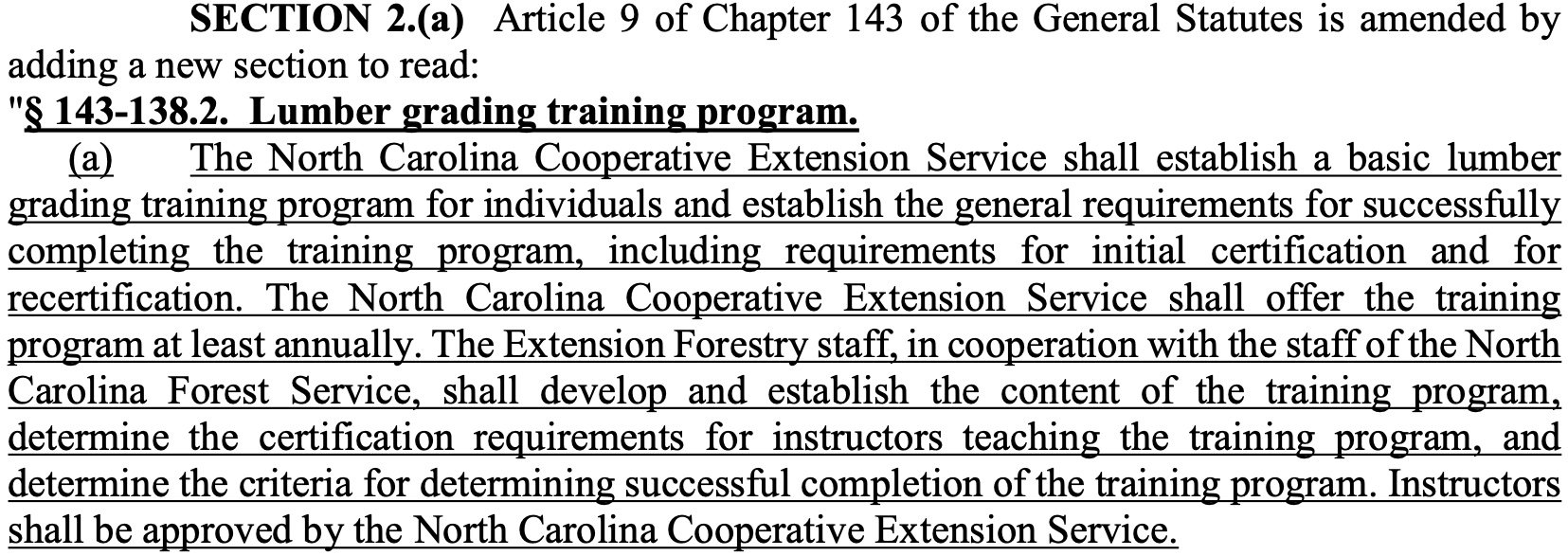Deep Dive: What HB295 Would Do
HB295: Promote NC Sawmills Act would create jobs, decrease urban tree waste, make housing more affordable, and make our state more resilient in the face of natural disasters. But what does the bill actually do? Here’s a breakdown of the proposed legislation, line-by-line. Before you begin, it may be helpful for you to know some key players and terms. Currently, there are national standards for softwoods used in residential construction. These standards, called PS-20, were created by the Department of Commerce’s National Bureau of Standards, and are maintained by the non-profit American Lumber Standards Committee (ALSC). The ALSC has created six set of rules for all kinds of lumber; for our purposes, the Standard Grading Rules for Southern Pine, published by the Southern Pine Inspection Bureau (SPIB), is relevant. This is a literal book with pictures that outlines allowable knot sizes in pine boards, disqualifying imperfections, etc. To ensure its standards are being met, the ALSC oversees 25 independent accredited agencies that monitor mills in the U.S. and Canada. In NC, there are agencies that work with the ALSC and inspect lumber— mostly for very large mill operations.
Section 1a: Current NC state law requires lumber used in residential construction to receive a grade stamp from a lumber grading bureau. This is a literal stamp that an inspector has put on the lumber. In most cases, this stamp is applied as a part of the manufacturing process in a very large commercial mill. Part 2 specifies that the law applies to sawmills that mill under one million board feet per year.
Section 1b: HB295 would allow builders to use lumber in residential construction that does not have the stamp of an agency, provided that the lumber and its acquisition meet certain criteria. The first criteria is that the lumber is sold by the sawmill to the builder/owner. The sawyer cannot sell to a wholesaler.
Section 1b.2: This section clarifies that the lumber must meet or exceed current lumber standards.
Section 1b.3: This section requires the sawyer to have a certificate from a state-approved lumber grading training program. Initially, this may be from a state that offers such certification and training. In the long-run, this would likely be through the program developed by the North Carolina Cooperative Extension and Extension Forestry. This section also includes the requirement that the lumber meet PS-20 standards and include a mark/stamp with identifying information.
Section 1.b.4: This section affirms that the lumber used must be inspected and approved by a local building inspector. It adds that that local official is not personally liable for mistakes made on the job.
Section 1.b.5: This section requires the sawyer to provide the buyer a certificate or record identifying key features and details about the wood and the lumber sale.
Section 1.c: This whole section reiterates what was outlined in 1.b. with two caveats. First, it tells the Building Code Council exactly what to include in the code and, second, it says that the terms can also apply to Residential Groups R-2 and R-3. Categorically, this includes a wide variety of multi-person buildings.
Section 1.d: This requires the Building Code Council to adopt temporary rules within five months and then replace those temporary rules with permanent ones. Tennessee’s native lumber law didn’t include specifics about the timeframe for implementation which caused it to take a long time to take effect.
Section 2a.a: This section tasks the NC Cooperative Extension with the work of creating the lumber grading training program. Extension Forestry and Forestry Service will also play a role in creating content and certification criteria.
Section 2.a.b: This section allows Cooperative Extension to approve other private companies to offer lumber grading courses and certification.
Section 2.a.c: Sawyers must be recertified every five years.
Section 2.a.d: Certified and trained sawyers must register with the NC Forest Service.
Section 2.b: Cooperative Extension must establish this training program within five months of the bill becoming law.
Section 3: This section requires the builder/applicant to supply the certificate/information about the lumber (and sale) during the permitting process.
Section 4: This section clarifies the timeframe for when this bill language becomes law and enforceable code.














